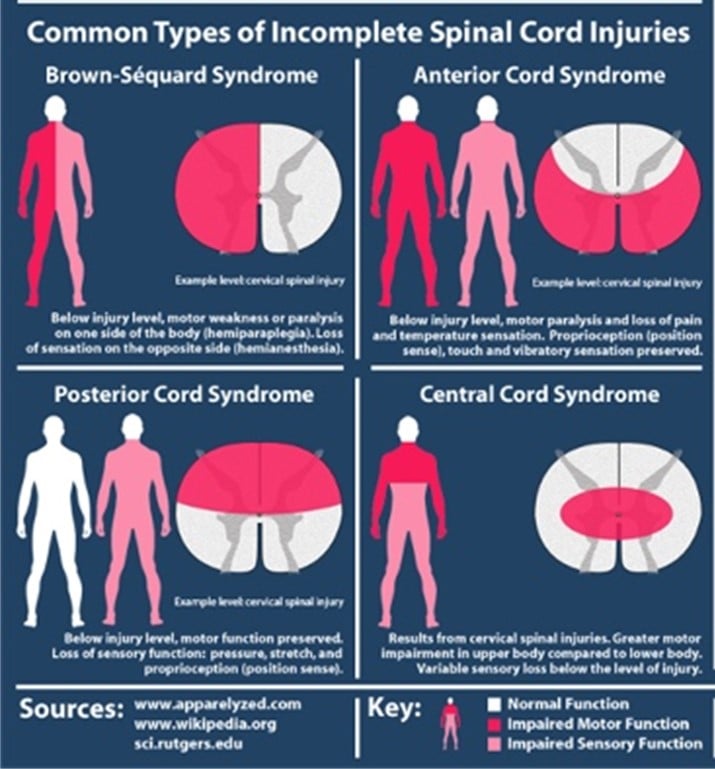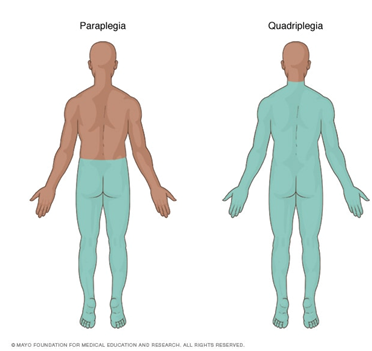Written By: William Harding and Daniel Garas, Summer Student
Being involved in a motor vehicle collision or an accident of another kind may result in an injury to the spinal cord. There are varying types of spinal cord injuries (SCIs) and depending on the injury, the symptoms will differ.
TYPES OF SPINAL CORD INJURIES
A) INCOMPLETE Spinal Cord Injury
These injuries are the most common of all spinal cord injuries – accounting for over 60% of SCIs.[1]
With an incomplete spinal cord injury, there still exists some degree of sensory and motor function below the site of the injury.[2] Severe chronic pain may result from these kinds of injuries.[3]
The Most Common Incomplete Injuries
1) Anterior Cord Syndrome
Anterior Cord Syndrome results when the injury is to the front of the spinal cord. Predominately, the anterior two-thirds of the spinal cord.[4] This type of injury usually results in “motor paralysis below the level of the lesion as well as [a] loss of pain and temperature at and below the level of the lesion.”[5] Symptoms will vary depending on what portion of the spinal cord is injured.
2) Central Cord Syndrome
Central Cord Syndrome is the most common type of spinal cord injury.[6] In this case, the injury is to the center of the spinal cord. This condition leads to “motor deficits that are worse in the upper extremities as compared to the lower extremities. It may also cause bladder dysfunction (retention) and variable sensory deficits below the level of injury.”[7] Recovery of some movement in the legs is possible; recovery of movement in the arms is rare.[8]
3) Brown-Sequard Syndrome
Brown-Sequard Syndrome is when the injury is on one side of the spinal cord – either the left or right side. The side of the body where the injury is located is affected the most. Symptoms of this injury include: “weakness or paralysis and proprioceptive deficits on the side of the body ipsilateral [same side] to the lesion and loss of pain and temperature sensation on the contralateral [opposite] side.”[9]
Other Incomplete Injuries
Other incomplete injuries include Cauda Equina Syndrome, Conus Medullaris Syndrome, and Posterior Cord Syndrome.
Cauda Equina Syndrome results when there is damage to the “bundle of nerve roots around the lumbar level of the spinal cord.”[10] The cause of CES is spinal compression. This injury weakens the affected muscles and creates a loss of sensation, but the movement is not necessarily affected.[11]
Conus Medullaris Syndrome affects the sacral cord and lumbar nerve roots. CMS has similar symptoms to CES.[12]
Posterior Cord Syndrome results from damage to the back of the spinal cord and causes poor coordination skills.[13]
B) COMPLETE Spinal Cord Injury
A complete spinal cord injury results when the spinal cord is fully compressed or severed and results in complete bilateral paralysis below the injured site. Bilateral means that both sides of the body are affected equally. In other words, sensory and motor function is completely lost below the point of the injury.
1) Quadriplegia (Tetraplegia)
Quadriplegia is paralysis that affects all four limbs: both of the arms and both of the legs. The lesion is in the cervical spinal cord[14] and as with any spinal cord injury, the location of the injury on the cervical spine will determine the severity of the paralysis.
2) Paraplegia
A paraplegic loses all sensory and motor functions in their legs and generally the pelvis, but not in their arms. The lesion is usually located in the thoracic or lumbar portions of the spinal cord.[15] Those that are paraplegic are generally more independent as a result.
CAUSES OF SPINAL CORD INJURIES
Spinal cord injuries result from damage to the vertebrae or discs, which causes compression on the spinal cord or damage to the spinal cord directly. This can result from a traumatic blow to a person’s spine.
Studies show that the most common causes for spinal cord injuries are the following: motor vehicle accidents, falls, acts of violence, and sports and recreation.[16]
HAVE YOU SUFFERED A SPINAL CORD INJURY?
If you or a loved one has suffered a spinal cord injury as a result of the negligence of another person, please contact one of the personal injury lawyers at McLeish Orlando LLP for a free consultation.
[1] Types of Spine Injuries, Sonoran Spine, December 27, 2016, Accessed on July 7, 2021, https://www.sonoranspine.com/blog/item/types-of-spine-injuries.
[2] What is an SCI, Spinal Cord Injury Ontario, Accessed on July 7, 2021, https://sciontario.org/support-services/info-insights/living-with-an-sci/what-is-an-sci/.
[3] Complete vs Incomplete Spinal Cord Injury: What You Need to Know, SpinalCord.com, February 11, 2020, Accessed on July 7, 2021, https://www.spinalcord.com/blog/complete-vs.-incomplete-spinal-cord-injuries [Complete v Incomplete SCI].
[4] Anterior Cord Syndrome, National Center for Biotechnology Information, Updated on August 10, 2020, Accessed on July 7, 2021, https://www.ncbi.nlm.nih.gov/books/NBK559117/.
[5] Ibid.
[6] Central Cord Syndrome, National Center for Biotechnology Information, Updated on March 6, 2021, Accessed on July 7, 2021, https://www.ncbi.nlm.nih.gov/books/NBK441932/.
[7] Ibid.
[8] Complete v Incomplete SCI, supra note 3.
[9] Brown Sequard Syndrome, National Center for Biotechnology Information, Updated on September 14, 2020, Accessed on July 7, 2021, https://www.ncbi.nlm.nih.gov/books/NBK538135/.
[10] Complete v Incomplete SCI, supra note 3.
[11] Ibid.
[12] Ibid.
[13] Ibid.
[14] Tetraplegia, National Center for Biotechnology Information, Accessed on July 7, 2021, https://www.ncbi.nlm.nih.gov/gtr/conditions/C0034372/.
[15] Ibid.
[16] Spinal Cord Injury, Mayo Clinic, Accessed on July 7, 2021, https://www.mayoclinic.org/diseases-conditions/spinal-cord-injury/symptoms-causes/syc-20377890; Complete v Incomplete SCI, supra note 3.








